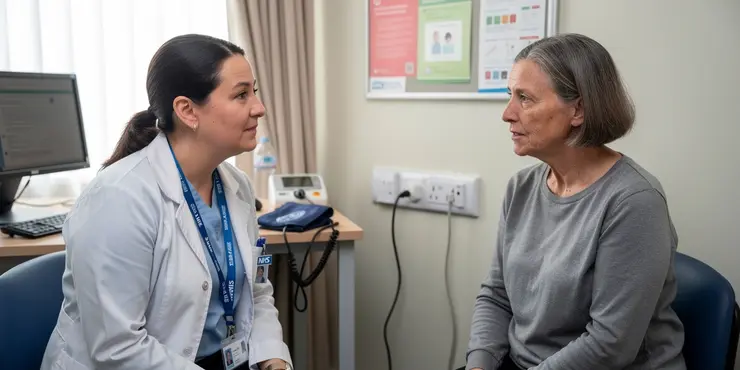
Find Help
More Items From Ergsy search
-

What role do infections play in chronic fatigue syndrome?
Relevance: 100%
-

Is chronic fatigue syndrome contagious?
Relevance: 98%
-

What causes chronic fatigue syndrome?
Relevance: 96%
-
What is chronic fatigue syndrome?
Relevance: 95%
-

Are there psychological aspects to chronic fatigue syndrome?
Relevance: 86%
-

Who is at risk of developing chronic fatigue syndrome?
Relevance: 86%
-
Is chronic fatigue syndrome a mental illness?
Relevance: 85%
-
Can children develop chronic fatigue syndrome?
Relevance: 82%
-

Is there a cure for chronic fatigue syndrome?
Relevance: 74%
-

How is chronic fatigue syndrome treated?
Relevance: 73%
-

Myalgic encephalomyelitis or chronic fatigue syndrome (ME/CFS) | NHS
Relevance: 69%
-

How is chronic fatigue syndrome diagnosed?
Relevance: 67%
-

Can chronic fatigue syndrome be managed with lifestyle changes?
Relevance: 59%
-

How does CFS differ from regular fatigue?
Relevance: 44%
-

Can E. coli infections be treated?
Relevance: 40%
-

What is Cushing's syndrome?
Relevance: 38%
-

What is irritable bowel syndrome (IBS)?
Relevance: 38%
-

What is congenital rubella syndrome?
Relevance: 37%
-

Are there any long-term effects of Chikungunya infection?
Relevance: 37%
-

What is post-treatment Lyme disease syndrome (PTLDS)?
Relevance: 34%
-

Can CFS be prevented?
Relevance: 34%
-

Prader-Willi Syndrome | NHS
Relevance: 33%
-

Munchausen's syndrome | NHS
Relevance: 33%
-

What is Chikungunya virus infection?
Relevance: 33%
-

Causes of irritable bowel syndrome (IBS)
Relevance: 33%
-

Mycobacterium chimaera infection
Relevance: 32%
-

Symptoms of irritable bowel syndrome (IBS)
Relevance: 32%
-

Can fatigue result in dangerous driving?
Relevance: 32%
-

Carpal Tunnel Syndrome
Relevance: 32%
-
Can ear infections lead to tinnitus?
Relevance: 32%
-

How is E. coli infection diagnosed?
Relevance: 31%
-

What causes chronic kidney disease?
Relevance: 31%
-

What populations are at higher risk for E. coli infections?
Relevance: 31%
-

About irritable bowel syndrome (IBS)
Relevance: 31%
-

Can air physiotherapy prevent respiratory infections?
Relevance: 31%
-

What causes Carpal Tunnel Syndrome?
Relevance: 31%
-

What are the symptoms of Nipah Virus infection?
Relevance: 30%
-
Can weight loss medications cause fatigue?
Relevance: 30%
-

Diagnosing irritable bowel syndrome (IBS)
Relevance: 30%
-

What is irritable bowel syndrome (IBS)?
Relevance: 30%
Understanding Chronic Fatigue Syndrome
Chronic Fatigue Syndrome (CFS), also known as myalgic encephalomyelitis (ME), is a complex disorder characterized by extreme fatigue that can't be explained by any underlying medical condition. This fatigue worsens with physical or mental activity but doesn't improve with rest. The specific cause of CFS remains unknown, making diagnosis and management challenging for healthcare professionals.
The Infection Connection
Infections have long been considered potential triggers for CFS. Several studies suggest that viral infections, in particular, may play a significant role in the onset of this disorder. Acute viral infections such as Epstein-Barr virus (EBV), which causes glandular fever, have been frequently studied for their association with CFS. Individuals often report the onset of CFS symptoms following an infection, supporting the theory that infections could initiate or exacerbate the condition.
Viruses and CFS
One of the most common viral culprits linked to CFS is the Epstein-Barr virus. While most people recover from EBV without lasting effects, some individuals develop prolonged fatigue and other CFS-related symptoms. Other viruses, including human herpesvirus 6 (HHV-6), enteroviruses, and cytomegalovirus (CMV), have also been implicated. These viruses can persist in the body and potentially trigger autoimmune responses, leading to chronic symptoms.
Bacterial Infections
Besides viruses, bacterial infections are also considered potential contributors to CFS. For instance, some researchers have examined the role of Borrelia burgdorferi, the bacterium responsible for Lyme disease, in prolonged fatigue syndromes. Similarly, Chlamydia pneumoniae and Mycoplasma species have been investigated for their potential association with chronic fatigue, although clear connections remain elusive.
Implications for Treatment
Understanding the role of infections in CFS could have significant implications for treatment. If infections are indeed a trigger, addressing these underlying infections might alleviate some CFS symptoms. Antiviral or antibiotic treatments tailored to specific infections could potentially be beneficial, although more research is needed to confirm their effectiveness. Treatment approaches focusing on immune modulation and reducing inflammation are also areas of ongoing research and interest.
Conclusion
While the exact role of infections in chronic fatigue syndrome remains unclear, they are considered a potential trigger or exacerbating factor. Identifying and understanding these infections could be key to developing more effective treatment options for individuals struggling with CFS. Continued research is crucial to unraveling the complexities of CFS, offering hope for better management and outcomes for those affected by the disorder.
What is Chronic Fatigue Syndrome?
Chronic Fatigue Syndrome (CFS) is a health problem that makes people very tired all the time. This tiredness does not go away with sleep or rest. Doctors do not know exactly what causes CFS, which makes it hard to diagnose and treat.
How Infections May Play a Role
Some researchers think infections might start or make CFS worse. There are studies that suggest viruses might be involved when CFS starts. For example, after an infection with the Epstein-Barr virus (which can give you glandular fever), some people develop CFS. This means infections could be a reason for CFS.
Viruses Linked to CFS
The Epstein-Barr virus is often linked to CFS. Most people get better after this virus, but some stay tired for a long time. Other viruses like human herpesvirus 6 (HHV-6), enteroviruses, and cytomegalovirus (CMV) might also play a part. These viruses can stay in the body and may cause a hard-to-stop immune response, leading to CFS symptoms.
What About Bacteria?
Not just viruses, but bacteria might also be linked to CFS. For example, Lyme disease from Borrelia bacteria can cause long-lasting tiredness. Other bacteria like Chlamydia and Mycoplasma are also being studied to see if they relate to CFS.
Why This Matters for Treatment
If infections cause CFS, treating the infections might help with the tiredness. Medicines that fight viruses or bacteria might help, but more research is needed. Scientists are also looking at treatments that could help the immune system and reduce swelling in the body.
What We Know So Far
Infections may start or worsen CFS, but we do not know for sure. Finding out more about these infections might help doctors treat CFS better. More research is needed, which might bring hope to people living with CFS.
Frequently Asked Questions
What is Chronic Fatigue Syndrome (CFS)?
Chronic Fatigue Syndrome, also known as Myalgic Encephalomyelitis (ME), is a complex and debilitating disorder characterized by extreme fatigue that cannot be explained by any underlying medical condition. The fatigue worsens with physical or mental activity but doesn't improve with rest.
Can infections trigger Chronic Fatigue Syndrome?
Yes, infections have been reported as potential triggers for Chronic Fatigue Syndrome. Many patients report the onset of symptoms following a viral infection.
Which infections are commonly associated with the onset of CFS?
Common infections associated with the onset of CFS include viral infections such as Epstein-Barr virus (EBV), human herpesvirus 6 (HHV-6), and enteroviruses.
How do infections contribute to the development of CFS?
Infections may contribute to the development of CFS by triggering an abnormal immune response, leading to persistent inflammation and fatigue.
Is Epstein-Barr virus linked to Chronic Fatigue Syndrome?
Yes, Epstein-Barr virus is one of the infections often studied in relation to CFS. Some patients report the onset of CFS symptoms following an EBV infection, such as mononucleosis.
What is the role of the immune system in CFS related to infections?
In CFS, an infection might cause the immune system to become dysregulated, resulting in ongoing fatigue and other symptoms despite the resolution of the initial infection.
Does treating an infection cure Chronic Fatigue Syndrome?
Treating the initial infection might not cure CFS. While some patients see improvements, others continue to experience chronic fatigue and other symptoms.
Can bacterial infections also trigger CFS?
Although viral infections are more commonly studied, bacterial infections like Lyme disease have also been implicated as potential CFS triggers.
How is CFS diagnosed if infections are involved?
CFS is diagnosed based on clinical criteria after excluding other medical conditions. If infections are suspected, specific tests might be conducted to confirm their presence.
Is there a specific infection that causes CFS?
There isn't a single infection known to cause CFS. It is likely that multiple infections can act as triggers in susceptible individuals.
Do all CFS patients have a history of infections?
Not all CFS patients report a history of infections. While infections are a common trigger, other factors can also contribute to the development of CFS.
Do chronic infections lead to CFS?
Chronic infections may play a role in sustaining or exacerbating CFS symptoms, but they are not the sole cause of the syndrome.
Are there any biomarkers for CFS related to infections?
Research is ongoing to identify specific biomarkers for CFS. Some studies have suggested immune markers, but there is no definitive test for CFS yet.
What is post-viral fatigue syndrome?
Post-viral fatigue syndrome is a condition where a person experiences prolonged fatigue following a viral infection. It shares similarities with CFS and may precede its diagnosis.
Can recurrent infections be a symptom of CFS?
Some CFS patients report experiencing recurrent infections. This might be due to underlying immune dysregulation associated with the syndrome.
Is there a vaccine to prevent infection-related CFS?
Currently, there is no vaccine specifically to prevent CFS as it can be triggered by multiple different infections and factors.
How are infections linked to the severity of CFS symptoms?
Infections might worsen the severity of CFS symptoms by exacerbating immune system dysregulation and inflammation.
What role do antiviral treatments play in managing CFS?
Antiviral treatments may be beneficial for CFS patients if an active viral infection is suspected, but they are not universally effective for all CFS cases.
Does CFS cause more frequent infections?
CFS itself is not known to cause more frequent infections, but patients may feel more susceptible due to underlying immune system issues.
Can lifestyle changes help manage infection-related CFS?
Lifestyle changes such as stress management, gentle exercise, and proper nutrition can help manage symptoms of CFS, although they may not address the underlying triggers.
What is CFS?
Chronic Fatigue Syndrome is also called ME.
People with ME feel very tired all the time. This tiredness is not caused by any other illness.
They feel even more tired after they do things, like playing or thinking hard. Resting does not help them feel better.
Tools that can help:
- Making a schedule can help people plan their day.
- Taking breaks often can keep them from getting too tired.
- Writing down thoughts and feelings in a diary can help too.
Can getting sick make you very tired for a long time?
Yes, getting sick can sometimes lead to Chronic Fatigue Syndrome. Many people begin feeling very tired after they have had a virus.
Which germs can cause CFS to start?
Getting sick with certain germs can lead to CFS. Some of these germs are viruses. They include:
- Epstein-Barr virus (EBV)
- Human herpesvirus 6 (HHV-6)
- Enteroviruses
If this is hard to read, you can:
- Use a screen reader to hear the text.
- Ask someone to read it with you.
- Break it down into smaller parts to understand better.
How do infections make Chronic Fatigue Syndrome (CFS) happen?
Getting sick can sometimes make people feel very tired for a long time. This might happen because the body's defense system acts differently and doesn't stop fighting, even after the illness goes away. This can make the person feel worn out and tired all the time.
To help understand or remember this, you can:
- Think of your body like a superhero that keeps fighting even when the danger is gone, which can make it tired.
- Use pictures or drawings to show how being sick can affect the body.
- Talk to someone about it to help explain it in an easy way.
Does Epstein-Barr virus cause Chronic Fatigue Syndrome?
Epstein-Barr virus (EBV) is a germ that can make people sick. Some people think it might be linked to Chronic Fatigue Syndrome (CFS), which makes you feel very tired all the time.
Doctors are still not sure if EBV causes CFS. More research is needed to understand this connection.
If you want to learn more, you can use simple words or videos to help explain things. Talking to a doctor can also help you understand better.
Yes, the Epstein-Barr virus (EBV) is linked to a sickness called Chronic Fatigue Syndrome (CFS). Sometimes, people show signs of CFS after getting sick with EBV. EBV can cause a sickness called mononucleosis, which some people call "mono" or the "kissing disease".
How does the immune system help with CFS and infections?
The immune system is like a shield. It helps protect the body from germs and infection.
In CFS (Chronic Fatigue Syndrome), the immune system might not work as well as it should. This can make it harder for the body to fight off infections.
Some tools that can help understand this better are pictures, videos, or talking with a nurse or doctor.
Using simple words and taking breaks can also make it easier to learn.
Sometimes, a sickness can make the body's defense system not work right. This can make people feel very tired for a long time, even after they get better from the sickness.
Can fixing an infection make Chronic Fatigue Syndrome go away?
Fixing the first sickness might not make CFS go away. Some people feel better, but others stay very tired and have more problems.
Can germs make you very tired?
We usually hear more about viruses, but bacteria can cause problems too. One example is Lyme disease, which might make people very tired and sick. This is called CFS.
How do doctors find out if someone has CFS when there are infections?
CFS is when doctors find out what's wrong after checking that it isn't something else. If doctors think an infection might be the problem, they can do some tests to see if it is.
Is there a germ that makes you tired all the time?
People with learning difficulties might find it helpful to use:
- Reading Apps: Tools that read text out loud can help.
- Picture Aids: Pictures can make information clearer.
- Breaks: Taking breaks can make reading easier.
No one infection causes CFS (Chronic Fatigue Syndrome). More than one infection might start CFS in some people.
Do all people with CFS get sick a lot?
Not everyone with CFS got sick from an infection. Getting sick can cause CFS, but there are other things that can cause it too.
Can long-lasting infections cause CFS?
Some people think that having an infection for a long time might cause a sickness called CFS (Chronic Fatigue Syndrome). This means feeling very tired all the time.
To help understand better, you can:
- Look at pictures that explain CFS.
- Talk to a doctor or nurse who knows about CFS.
- Watch videos about how infections can make people sick.
Germs that stay in our body for a long time might make CFS symptoms worse, but they are not the only reason people have CFS.
Are there signs of CFS in the body after infections?
Scientists are trying to find ways to test for CFS. Some think parts of the immune system can help. But right now, there is no special test for CFS.
What is post-viral fatigue syndrome?
Post-viral fatigue syndrome is when you feel very tired for a long time after being sick. This can happen after a virus, like the flu or a cold.
If you have this, it might be hard to do things like playing, studying, or working.
Ways to feel better:
- Rest a lot and sleep well.
- Eat healthy food.
- Ask a doctor for help if you need it.
When you feel really tired for a long time after getting sick from a virus, it's called post-viral fatigue syndrome. It's a lot like something called CFS, and sometimes it can come before being told you have CFS.
Can getting sick a lot be a sign of CFS?
Some people with CFS (Chronic Fatigue Syndrome) say they get infections often. This might happen because their immune system is not working right.
Can a vaccine stop infection-related CFS?
Right now, there is no shot to stop CFS. This is because many things can make CFS happen, like different germs.
Do Infections Make CFS Symptoms Worse?
Sometimes, germs that make you sick can make CFS symptoms feel worse.
If you have CFS, you may feel more tired or have more pain if you get an infection, like a cold or the flu.
If you feel worse when you are sick, tell a doctor. They can help you feel better.
Using a calendar to track symptoms and infections can help too. This way, you can see if infections are making things worse over time.
Infections can make CFS symptoms worse. They can upset the immune system and cause more swelling in the body.
How do antiviral medicines help people with CFS?
Medicine to fight viruses might help if a person with CFS (chronic fatigue syndrome) has a virus. But this medicine does not help everyone with CFS.
Does CFS Make You Get Sick More Often?
CFS means Chronic Fatigue Syndrome. It can make you feel very tired.
People with CFS might get sick more often. This can be with colds or other infections.
If you have CFS and get sick a lot, talk to a doctor. They can help you feel better.
Here are some tips that might help:
- Wash your hands often to keep germs away.
- Eat healthy foods to stay strong.
- Rest when you feel tired.
- Ask friends or family for help if needed.
Having CFS by itself doesn't make people get sick more often. But, people with CFS might feel like they get sick easily because of their immune system.
Can changing how you live help with feeling tired from being sick?
Sometimes people feel very tired after being sick. Changing some things in your life might help.
Here are some tips:
- Rest a lot and sleep well.
- Eat healthy foods like fruits and vegetables.
- Try to be calm and not stress too much.
- Do gentle exercises, like walking.
If you’re not sure what to do, talk to a doctor.
There are tools to help, like:
- Meditation apps for calmness.
- Diet apps to track healthy eating.
Remember, little changes can help you feel better!
Making changes in your life can help if you feel very tired all the time. Try things like keeping calm, doing light exercise, and eating healthy food. These things can help you feel better, but they might not fix what is making you tired.
Useful Links
This website offers general information and is not a substitute for professional advice.
Always seek guidance from qualified professionals.
If you have any medical concerns or need urgent help, contact a healthcare professional or emergency services immediately.
Some of this content was generated with AI assistance. We’ve done our best to keep it accurate, helpful, and human-friendly.
- Ergsy carfully checks the information in the videos we provide here.
- Videos shown by Youtube after a video has completed, have NOT been reviewed by ERGSY.
- To view, click the arrow in centre of video.
- Most of the videos you find here will have subtitles and/or closed captions available.
- You may need to turn these on, and choose your preferred language.
- Go to the video you'd like to watch.
- If closed captions (CC) are available, settings will be visible on the bottom right of the video player.
- To turn on Captions, click settings .
- To turn off Captions, click settings again.
More Items From Ergsy search
-

What role do infections play in chronic fatigue syndrome?
Relevance: 100%
-

Is chronic fatigue syndrome contagious?
Relevance: 98%
-

What causes chronic fatigue syndrome?
Relevance: 96%
-
What is chronic fatigue syndrome?
Relevance: 95%
-

Are there psychological aspects to chronic fatigue syndrome?
Relevance: 86%
-

Who is at risk of developing chronic fatigue syndrome?
Relevance: 86%
-
Is chronic fatigue syndrome a mental illness?
Relevance: 85%
-
Can children develop chronic fatigue syndrome?
Relevance: 82%
-

Is there a cure for chronic fatigue syndrome?
Relevance: 74%
-

How is chronic fatigue syndrome treated?
Relevance: 73%
-

Myalgic encephalomyelitis or chronic fatigue syndrome (ME/CFS) | NHS
Relevance: 69%
-

How is chronic fatigue syndrome diagnosed?
Relevance: 67%
-

Can chronic fatigue syndrome be managed with lifestyle changes?
Relevance: 59%
-

How does CFS differ from regular fatigue?
Relevance: 44%
-

Can E. coli infections be treated?
Relevance: 40%
-

What is Cushing's syndrome?
Relevance: 38%
-

What is irritable bowel syndrome (IBS)?
Relevance: 38%
-

What is congenital rubella syndrome?
Relevance: 37%
-

Are there any long-term effects of Chikungunya infection?
Relevance: 37%
-

What is post-treatment Lyme disease syndrome (PTLDS)?
Relevance: 34%
-

Can CFS be prevented?
Relevance: 34%
-

Prader-Willi Syndrome | NHS
Relevance: 33%
-

Munchausen's syndrome | NHS
Relevance: 33%
-

What is Chikungunya virus infection?
Relevance: 33%
-

Causes of irritable bowel syndrome (IBS)
Relevance: 33%
-

Mycobacterium chimaera infection
Relevance: 32%
-

Symptoms of irritable bowel syndrome (IBS)
Relevance: 32%
-

Can fatigue result in dangerous driving?
Relevance: 32%
-

Carpal Tunnel Syndrome
Relevance: 32%
-
Can ear infections lead to tinnitus?
Relevance: 32%
-

How is E. coli infection diagnosed?
Relevance: 31%
-

What causes chronic kidney disease?
Relevance: 31%
-

What populations are at higher risk for E. coli infections?
Relevance: 31%
-

About irritable bowel syndrome (IBS)
Relevance: 31%
-

Can air physiotherapy prevent respiratory infections?
Relevance: 31%
-

What causes Carpal Tunnel Syndrome?
Relevance: 31%
-

What are the symptoms of Nipah Virus infection?
Relevance: 30%
-
Can weight loss medications cause fatigue?
Relevance: 30%
-

Diagnosing irritable bowel syndrome (IBS)
Relevance: 30%
-

What is irritable bowel syndrome (IBS)?
Relevance: 30%


